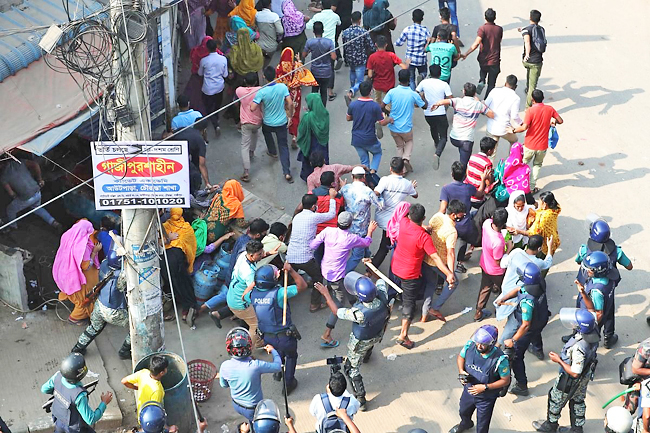DHAKA (AFP) – For a decade, the nimble fingers of Bangladeshi garment worker Naim Pramanik sewed shirts and trousers for top Western brands, to be worn by the wealthy across the world.
Now the 28-year-old is unemployed, sacked after daring to take part in protests demanding a fair wage.
“Some clothes we make are sold at USD100 a piece in shops in America and Europe,” he said, showing the labels of American fashion giant Tommy Hilfiger and British brand George.
“We don’t get more than USD100 a month.”
The South Asian country – the world’s eighth most populous, with about 170 million citizens – was last month rocked by its worst labour unrest in a decade.
Tens of thousands of workers clashed with police for a BDT23,000- (USD208) minimum monthly wage, up from the BDT8,300 set by the government five years ago. At least five people were killed.
Pramanik joined protests last month because his USD75 monthly salary was “killing us”.
The garment industry has been the key driver of impressive economic growth in Bangladesh as it has overtaken neighbouring India in GDP per capita, and made it a darling for Western brands such as H&M, Levi’s, Uniqlo and Zara.



But experts said the industry has failed to lift its four million workers out of poverty.
“We took to the streets for our legitimate demands and that’s why my factory fired me,” said Pramanik, who gained attention after his comments to a news website during protests were shared widely on social media.
Mahmudul Hasan, a spokesman for his former employer Wear Mag, said he was sacked because “he was absent in duties for days”.
Sitting on the bed in his cell-like, 4.5-square-metre home in the Pallabi suburb of the capital Dhaka, which he shares with his wife and baby, Pramanik pulled out a nearly empty pot of rice.
“These are the last few rice grains I have got. Once this finishes, I won’t have anything to eat,” he said.
“I’ll have to either beg or borrow to provide food.”
He received a BDT67,000 (USD610) severance package, but debts swallowed much of that, and he does not know how he will pay his next rent demand.
Pramanik sent much of his pay to his family in a village in the northern rural district of Sirajganj, which many have left after farming jobs dried up with the mechanisation of agriculture.
In Dhaka, he shares a kitchen and toilet with eight other families.
“After paying my house rent and debts, nothing remains,” he said, worried about supporting his baby.
“Just look at my house, it has nothing. I sleep on a broken bed.”
Last month a state-appointed panel raised the minimum monthly wage by 56 per cent to BDT12,500, but the unions rejected the wage, saying it did not match soaring prices for food, rent and healthcare.
Global rights group Clean Clothes Campaign said it was “not a living wage but the bare minimum that is needed for workers to make ends meet”.
Unions have since stopped protests in the wake of a major police crackdown, but warn they will resume if demands are not met by early January, when Bangladesh will also hold general elections.
Garment factory owners are among the wealthiest people in the country, and several are also lawmakers.
Pramanik is not the only one to have been sacked. Unions said hundreds of workers have lost their jobs for joining the demonstrations.
Prodip Ray, 38, a union leader who led protests in the capital’s Mirpur district, said there was a “culture” of sacking workers “just because they took part in a protest”.
Those now jobless include Akter, 28, a single mother, who asked to not be fully identified for fear of retaliation.
“I don’t know how I will pass this month,” she said, adding that she had less than four dollars in savings.
“I don’t know how I’ll take care of my son… the time to pay the house rent is knocking.”



















































